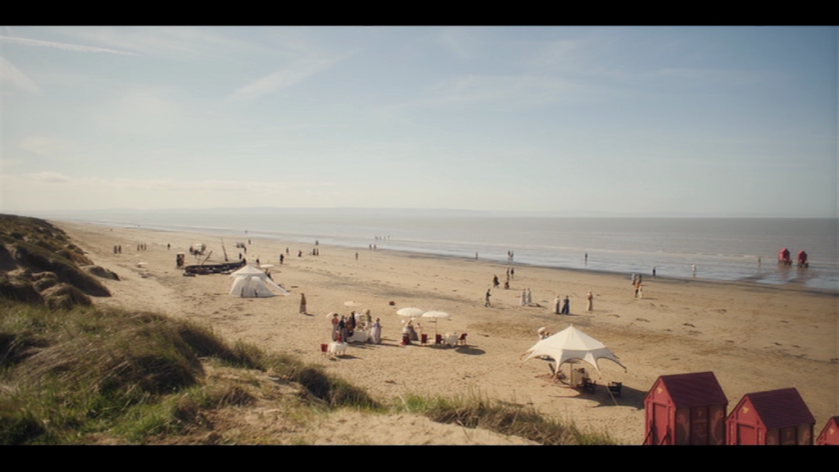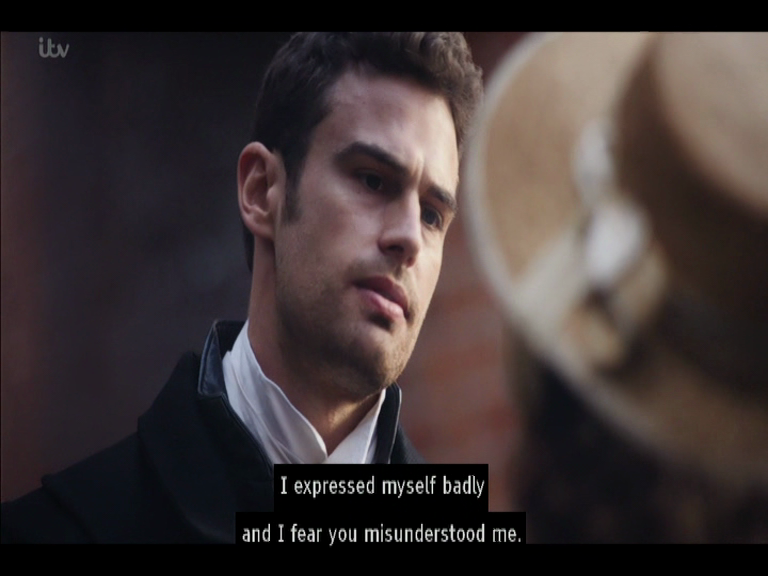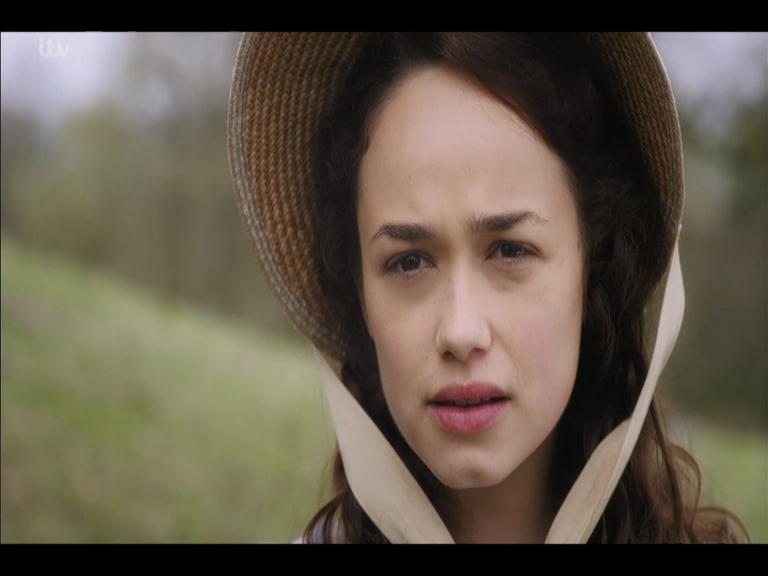Arthur Parker (Turlough Convery) and Georgiana Lambe (Crystal Clarke) — a convincingly warmly congenial couple: they act out of kindness to one another, actually talk to one another, support one another — I am sure I am not alone in wishing this Parker brother’s implicit homosexuality had not gotten in the way
The three friends: Alison Parker (Rosie Graham), Charlotte’s younger romantic sister; Charlotte (Rose Williams), once again our grave heroine; and Georgiana, wary, distrustful, somewhat alienated
Dear friends and readers,
Two and one-half years of pandemic later, Andrew Davies’s creation of an experimental Sanditon (alas he wrote the last episode only) returned. It resembles the first (see Episodes 1-4: by the sea, by the sea, by the beautiful sea; and 5-8: zigzagging into a conclusion in which nothing is concluded) by its use of a too many stories at once, one of which is over-the-top melodrama: centered again in Edward Denham (Jack Fox), Clara Brereton (Lily Sacofsky) as his now discarded pregnant mistress, and Esther (Charlotte Spencer) become Lady Babbington desperate for a child.

An aggressive Esther & vulnerable Clara as enemies at the harsh-mouthed tactless Lady Denham’s (Anne Reid) table
Life is again a matter of pleasures in which all the characters participate: this time it’s a fair or summer festival complete with a contemporary balloon ride dared by Charlotte and the Wickham character of the piece, Colonel Lennox (Tom Weston-Jones), rescued by Arthur (this character is the quiet true hero of this season); another ball, afternoon garden party, complete with archery (in lieu of cricket),

The male rivals: Colborne in front, Lennox to the back
with a sequence of magical dancing between Charlotte caught up, entranced and entrancing, her seemingly Rochester-like employer, Alexander Colborne:
Tom Parker (Kris Marshall) is still irresponsible, getting into debt, now at a loss without Sidney; Mary (Kate Ashfield), his long-suffering prosaic wife turned mother-figure by his side. There is whimsy; many individuals walk or ride along the seashore; too many shirtless men.

Tom Parker confronting Captain Lennox over debt — interestingly, this is a motif from Austen’s draft as continued by Anna Lefroy
But it differs too, most obviously in that several of the central actors & actresses had long since signed other contracts when it seemed there would be no second season. Thus this season the first episode is taken up with grieving for the suddenly dead (in Antigua) Sidney (Theo James), and in the last he (together with Arthur) improbably saves all by proxy when his box arrives, with money (he was always good for that in the previous season) and letters exposing villains: Charles Lockhart [Alexander Vlahos] turns out to be no innocent painter seeking Georgiana’s hand, but the nephew of her white planter-father seeking to replace her as heir. Esther has to appear sans mari (Mark Stanley), so we have to endure a silly gaslight story where Edward steals Babbington’s letters, as he tries to poison Esther so his baby son by Clara can be Lady Denham’s only heir. Diana (Alexandra Roach siphoned off to another series) was no longer catering to and making a hypochondriac out of Arthur, much to the improvement of Arthur.
New men were supplied: a lying soldier, William Carter (Maxim Ays) who Willoughby-like pretends to the poetry-loving Alison he loves and writes poetry when it’s the physically brave and truthful Captain Fraser (Frank Blake) who’s the poet and love-letter writer. Alison is, however, an innocuous boringly innocent Marianne with no serious story about sexual awakening (as has Austen’s heroine).

On the beach during one of the many festive occasions, time out to look at one’s cell phone
I did miss Mr Stringer (Leo Suter) — we hear he is doing well as an architect in London. A mildly comic vicar-type, Rev Hankins (Kevin Elder) and his well-meaning sister-chaperon for Georgiana, Miss Beatrice Hankins, spinster (Sandy McDade) thicken the scenes’ comedy nicely (as in a recipe).
The addition with a sense of weight and original presence is Alexander Colborne (Ben Lloyd-Hughes) — his romance with Charlotte had some convincing darker emotions: years before his wife, Lucy, had left him for London, not liking his tendency to a withdrawn awkward state, and been seduced by the Wickham-Lennox who provides obstacles to Charlotte and Colborne’s relationship in the form of lies (he accused Colborne of what he had done). Guilt and anger and depression keeps him isolating himself from Lucy’s daughter by Lennox (Flora Mitchell as Leonora who dresses up as a boy – some hints at a trans person there), and a resentful niece, Augusta Markam (Eloise Webb).
Charlotte has declared now that Sidney is dead, she has thought the better of marriage and will instead support herself and is hired by Colborne by the end of the first episode to care for and teach his daughters. She brings the whole family out of their obsessive cycles of reproach, self-inflicted frustration and loneliness — by her patience, compassion, inventiveness. This is the over-arching story and along with Arthur and Georgiana’s relationship, it’s the most alive and interesting matter in the season. Here is this pair learning about one another at a picnic:

Charlotte and her employer, Alexander Colbourne reach some understanding
What one can say on behalf of this very commercialized semi-Austen product in itself? First the dialogue and language in general is a cross-between 18th century styled sentences and modern demotic talk and is often witty: e.g, “how we are a stranger to our own affections” says Charlotte. Lady Denham’s way of commenting that no one chooses to be a spinster remains in our minds. The actors had to have worked hard to say lines like this in the natural quick way they do. There is a good deal of successful archness and even irony now and again. Andrew Davies’s concluding episode is the most natural seeming at this.
I very much enjoyed the imitations of story motifs and patterns in Austen’s novels: beyond those already mentioned, Rose Williams has managed to recapture the feel of the heritage Austen heroines: self-sacrifice, earnestness, perceptive behavior combines with a strong sense of selfhood. She is a kind of Elinor Dashwood blended with Elizabeth Bennet; Colborne is a Darcy figure as much as Rochester — at first Charlotte believes Lennox’s lies. Mr Lockhart’s painting Miss Lambe echoes the picture-making in Emma. The picnic again put me in mind of Emma. When Fraser gives Alison a wrapped book as a present and tells her how he values her friendship is a repeat of Edward’s gift of wrapped book to Elinor in Davies’s 2009 Sense and Sensibility so disappointing Elinor with a similar avowal and retreat.

On the other side of the wall, the other characters are listening, hoping for the proposal that finally comes
The worst: the experience is jerky, not smooth, the dialogues at time absurdly short, and as I felt with the previous season (more than 2 years ago), scenes seem not rehearsed or edited enough. I also concede that much that goes on would have horrified Austen as romance material; nevertheless, Clara’s baby out of wedlock can be found central to an off-stage and on-stage stories (e.g., Charlotte Smith’s) in the era; Charlotte Spencer shows her real talent for acting when she is transformed into a such a sweetly gratified mother upon adopting Clara’s baby. Turlough Convery, Rose Williams, Ben Lloyd-Hughes and Charlotte Spencer all provide credible varied depths of feeling to their scenes.
I noticed the film-makers used the same music as in the first season – very cheerful and sprightly and the continuity as well as the well-drawn paratext animation (cut-outs in the old Monty Python style) brings back memories lingering from the previous season.
It was filmed in the same or similar places (Wales, Dyrham Park)
Again the series ended with a cliff-hanger. At the last moment when Charlotte is expecting Colborne to propose at long last, he demurs. We are left to surmise he is afraid he will disappoint her as he did his wife (Lennox needles him as also at fault in the failure of his marriage) but Charlotte is now tired of being batted about (so to speak). She took a lot of punishment from Sidney and now she is being twisted and turned off by Colborne. The sequence goes this way: his older daughter, Augusta, scolds him for not opening up to Miss Heywood and demands Colborne thank Charlotte deeply for all she’s done:

A family once again (and it does not matter that they are not biological father and daughters)
Colborne is to ask Charlotte to stay by marrying her. But when he goes off to propose, Charlotte rejects him. The series overdid this turn and undermined it thematically by having her two months later announce that she is at long last engaged to Ralph Starling (who we heard about as a long-standing suitor back at Willenden).
The sudden new information (from Sidney’s box) that Georgiana’s mother is alive after all and her determination, now that she has been taken in by the Parker family, to find her mother was another obvious bridge: there is an unaccounted for black woman who works for Colborne; she does not behave like an enslaved person. Two people I know said they expect her to turn out to be (what a coincidence! like a fairytale Shakespeare ending) Georgiana’s mother.

Flo Wilson plays the role of Mrs Wheatley (I could not find any stills of her in costume): her last name alludes to the black American 18th century poet, Phillis Wheatley
I will watch Season 3; I even look forward to it. The film-makers are trying to make a sort of Austen sequel-film, a somewhat heritage type criss-crossed by modern behavior and ideas and appropriations. We must forgive them when they pander too obviously now and again: Alison as the princess bride does not do too much harm. It is a series with its heart and mind in the right moral place: any series that can make Turlough Convery, a heavy-set non-macho male who is a superb actor (I’ve seen him as a scary thug, and in Les Miserables he was the most moving of the revolutionaries) the male we most like, admire, and know we can depend on, is worth supporting.

Arthur — the question is, did he really say it was that he was so attracted to Lockhart that he advised Georgiana not to dump him …
Ellen




















